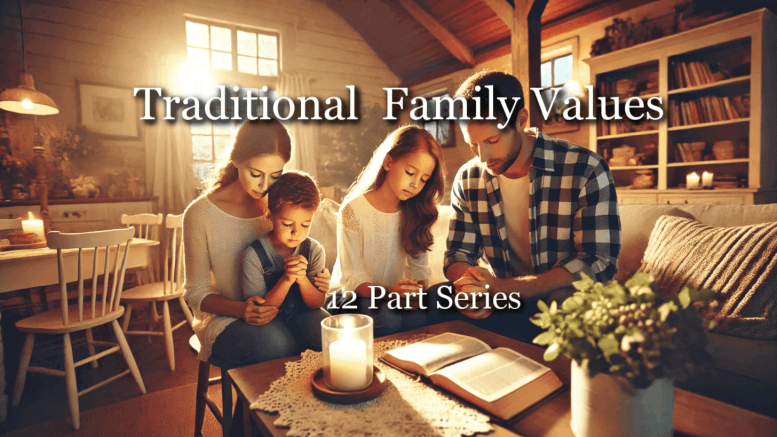The Biblical Foundation of Marriage
In our previous post, we explored the critical importance of traditional family values and the adverse effects that arise when these values are neglected. We saw how the traditional family structure, as ordained by God, is essential for societal stability and the well-being of children. Today, we delve deeper into the biblical foundation of marriage, tracing its origins and significance from the creation account in Genesis. (This series will accumulate on our 12 12-part series on the Traditional Family)
Creation of Marriage in Genesis
The concept of marriage is deeply rooted in the Bible, originating from the creation narrative in Genesis. In Genesis 2:18, God states, “It is not good that the man should be alone; I will make him a help meet for him.” This declaration underscores the importance of companionship and the necessity of a suitable partner for man. God then creates Eve from Adam’s rib, highlighting the intimate and intrinsic connection between man and woman.
Genesis 2:24 further emphasizes this bond: “Therefore shall a man leave his father and his mother, and shall cleave unto his wife: and they shall be one flesh.” This verse establishes the foundation of marriage as a divine institution where two individuals unite to become one entity. Marriage’s physical and spiritual union reflects God’s design and purpose for humanity.
Companionship and Intimacy
Marriage, as described in the Bible, is not merely a social contract but a sacred covenant that fulfills human needs for companionship and intimacy. Proverbs 18:22 states, “Whoso findeth a wife findeth a good thing, and obtaineth favor of the LORD.” This verse highlights the blessing and favor of finding a life partner.
In his book Marriage Under Fire, Dr. James Dobson elaborates on the significance of marital companionship. He writes, “One might begin to suspect that something mystical within human nature must be drawing the sexes together—not just for purposes of reproduction as with animals, but to satisfy an irrepressible longing for companionship, intimacy, and spiritual bonding.” This perspective aligns with the biblical understanding that marriage is designed to meet deep-seated human needs for emotional and spiritual connection.
The Universal Institution of Marriage
Marriage is a universal institution that transcends cultures and periods. It is the oldest human institution, established by God at the beginning of creation. Hebrews 13:4 affirms the honor and sanctity of marriage: “Marriage is honorable in all, and the bed undefiled: but whoremongers and adulterers God will judge.”
Despite its universal recognition, marriage is facing challenges in modern society. A 2003 article in The New York Times declared, “The United States is becoming a post-marital society.” This observation points to a growing trend where marriage is viewed as optional or outdated. However, the decline of marriage has significant implications for societal stability and the welfare of children.
Research consistently shows that children raised in stable, two-parent households fare better in various aspects of life. A study published in the Journal of Marriage and Family found that children living with both biological parents have better academic, emotional, and social outcomes compared to those from single-parent or step-family households (SpringerLink). These findings underscore the importance of maintaining the traditional family structure to ensure the well-being of future generations.
The Role of Parents in a Traditional Family
In a traditional family, parents play a crucial role in modeling God’s love and teachings to their children. Proverbs 22:6 instructs, “Train up a child in the way he should go: and when he is old, he will not depart from it.” This verse highlights the responsibility of parents to provide spiritual and moral guidance to their children.
The presence of both a father and a mother in the home provides a balanced environment for child development. Studies have shown that children with involved fathers are less likely to engage in delinquent behavior and more likely to succeed academically. According to the U.S. Department of Justice, “Young men who grow up in homes without fathers are twice as likely to end up in jail as those who come from traditional two-parent families” (LiveAbout). This statistic highlights fathers’ crucial role in their children’s lives and the broader implications for society when fathers are absent.
Conclusion
The biblical foundation of marriage emphasizes the sacredness and significance of the marital union designed by God. Marriage is not just a cultural tradition but a divine institution. It fulfills human needs for companionship, intimacy, and spiritual growth. This series will explore how biblical principles can address social challenges. Upholding the sanctity of marriage and traditional family structures fosters a healthier, more stable society, reflecting God’s love and purpose for humanity.
Call to Action
As we reflect on the biblical foundation of marriage, let us honor and uphold its sanctity. Doing so fulfills God’s purpose for our relationships and contributes to future generations’ well-being. Let us pray for strength and wisdom to navigate modern society’s challenges while adhering to God’s timeless principles.
As a first step, we encourage you to share our 12-part series on traditional family values with others. Spreading these insights can help foster understanding and support for the biblical foundation of marriage and family.
Family Structure and Child Outcomes on Springer.
This research indicates that children with both biological parents fare better. This is measured across various measures compared to those from single-parent or step-family households.
(SpringerLink) (SpringerLink) (SpringerLink).
The author partially generated this text with GPT-4.0, OpenAI’s large-scale language-generation model. Upon generating draft language, the author reviewed, edited, and revised it to their liking. The author takes ultimate responsibility for the content of this publication.




